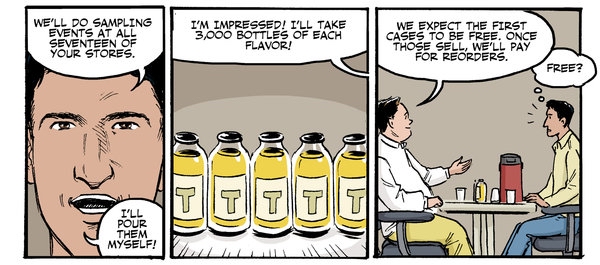“People ask me if it’s a graphic novel, and I say that it’s graphic, but not a novel,” said the Honest Tea co-founder Seth Goldman. Together with Barry Nalebuff, who was his professor while at the Yale School of Management, the two are sharing their company-building lessons in illustrated panels that track the brand’s start in 1998 — and its many missteps and near disasters — through to the flourishing company that was bought in 2011 by Coca-Cola.

Starting, and succeeding at, any start-up is so nip-and-tuck that Mr. Goldman, the chief executive, said that he was constantly asked to share the secrets of Honest Tea in rising from $1.1 million in sales in 1999 to $75 million at the time Coke took control.
“The truth is that we stumbled around quite a bit,” Mr. Goldman said. “We experienced countless rejections, sleepless nights, using much of our life savings, and all for an idea that was pretty simple — bottled tea that actually tastes like tea.”
The simple premise that Mr. Goldman and Mr. Nalebuff could make a less sweet but good-tasting drink was far from a glide to success, to judge by the book, “Mission in a Bottle.”
Their odyssey included buying a bottling plant that turned out to be a money-eating operation, compounded by other mishaps like mismatched labels, moldy tea and glass shards that set the company back and cost more than $1 million altogether. They also confess to overreaching when they strayed from their core bottled beverage business and produced tea bags, a product that failed to catch fire.
The hallelujah part of the story was getting Coca-Cola to first buy a minority share in 2008, and then full ownership, while retaining control of the company.
To lay out the dozen years of Honest Tea’s ups and downs before that point, Mr. Goldman borrowed an idea from something he loved doing with his three sons — reading comic books. He wanted to illustrate the company’s story, and persuaded Mr. Nalebuff, who has written five other books, to come aboard.
“I wondered if the world really needed another business book,” said Mr. Nalebuff, “but I thought that if we were going to write one, it should be really different.”
They also are adopting a nontraditional approach to marketing the book, set to be published on Sept. 3 by Crown Business, a unit of Random House. The pair, with a budget they did not disclose, are focusing on online and social media efforts, and have created a Web site, missioninabottle.net, where, for $25, a customer can buy a book, a signed bookplate and a T-shirt.
Also available is a $2,100 package for 100 books and other merchandise or a consultation (price negotiable) for people who want to start socially responsible businesses or to inspire their employees.
The book’s marketing is separate from the company, whose advertising spending was $1.5 million in 2012, according to figures from Kantar Media, a unit of WPP. The book may attract some brand customers, but it is aimed at would-be entrepreneurs, with the first year’s proceeds destined to go to three nonprofits, including the National Foundation for Teaching Entrepreneurship, which works with high school students on developing start-up skills.
Before they committed to a graphic-style history, Mr. Nalebuff studied how to write a comic book. But the graphic style had typically not been linked to more ponderous business stories, an area for which it may be well suited, said brand experts.
“The graphic approach blends with the Web and digital communications, including the infographics, that all of us use,” said Michel Ruby, executive creative director at Stein & Partners Brand Activation. “Pictures offer a strong sensory experience.”
Using graphics, said Mark Evanier, a Los Angeles-based comics historian, makes “a book more accessible because people think it’s fun. It feels not too heavy, boring or pedantic, and communicates an idea quickly. And it makes the characters larger than life.”
Translating the Honest Tea brand story idled, said Mr. Nalebuff, until the comic book artist Sungyoon Choi was hired to convert their experiences into dozens of illustrations. Even so, Roger Scholl, the book’s editor at Crown Business, decided to add a text-only summary after each of the book’s section to sum up the lessons learned from the illustrated material.
“We’re aiming for the start-up crowd,” said Mr. Scholl, “and we needed something fresh in the business category, and this format makes it easier to digest.”
Mr. Goldman says that some of the company’s crucial survival moments were easier to illustrate than to explain in print, like the warrants that Mr. Nalebuff designed to attract investors, but that allowed the co-founders to keep control of the company, a financial arrangement Mr. Goldman concedes, in one book panel, that he did not then understand.
Putting the book together, said Mr. Nalebuff, helped him focus on what kind of brand they had built, noting that, “for the first five years we thought we were a tea company. That’s why we added tea bags to the line.”
“It wasn’t until years later after our beverages, Honest Ade and Honest Kids, took off that we realized the most important word on our name wasn’t ‘tea.’ It was ‘Honest,’ ” he said. “Our brand meant authentic, healthier, organic products.”





